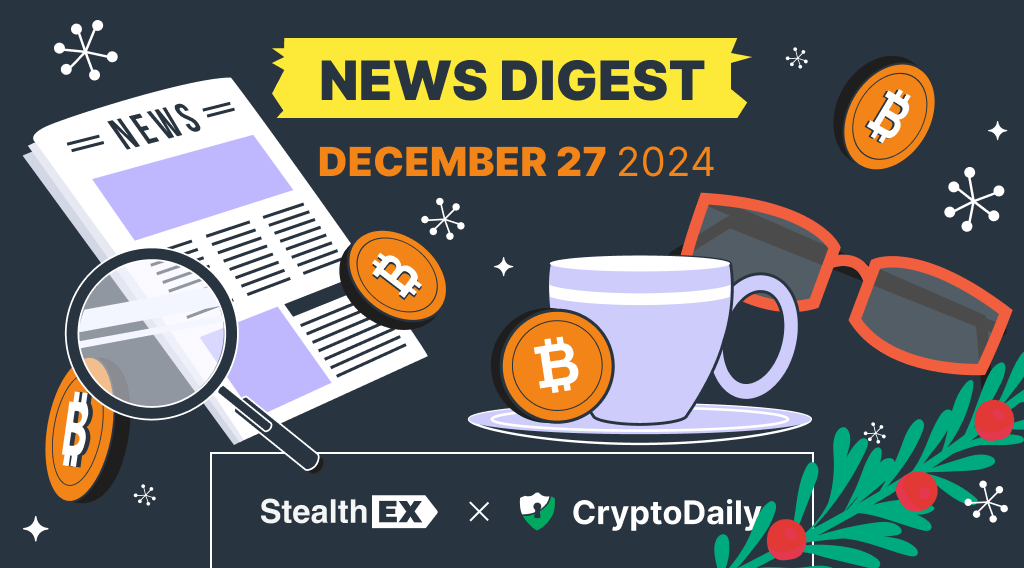Latest Crypto News: Trump’s Bitcoin Reserve, Do Kwon Extradition & Russia’s Crypto

Stay in the know with StealthEX and CryptoDaily. Each week, we highlight the biggest stories in crypto. Want to see what’s trending? Our simple breakdown covers the key updates you need to know. No fluff, just the facts. Stay informed and ready to dive into the latest happenings.
Let’s jump in!

Article contents
- 1 Trump’s Bitcoin Reserve Plan Could Reshape Crypto Market Dynamics
- 2 Terraform Labs Co-Founder Faces Extradition Decision in Montenegro
- 3 Russia Turns to Bitcoin for International Trade Amid Sanctions
- 4 Lightchain AI’s AIVM: A Breakthrough for Blockchain and AI Integration
- 5 Sonic SVM’s Bold Airdrop: $SONIC Tokens for TikTok Users
- 6 Charles Hoskinson Envisions Crypto Revival Under Trump’s Leadership
- 7 North Korean Hackers Dominate Crypto Theft in 2024
- 8 El Salvador Reaffirms Commitment to Bitcoin Despite IMF Deal
Trump’s Bitcoin Reserve Plan Could Reshape Crypto Market Dynamics
President-elect Donald Trump has announced plans to sign an executive order establishing a Bitcoin reserve on his first day in office. The move has sparked intense speculation about how it might disrupt Bitcoin’s traditional four-year boom-bust cycle and potentially usher in a new era of crypto growth—a so-called “supercycle.”
This concept gained traction earlier this year when Wyoming Senator Cynthia Lummis proposed the Bitcoin Reserve Act, which outlines a strategy for the U.S. government to accumulate Bitcoin as a treasury asset. States like Texas and Pennsylvania have also introduced similar initiatives, and countries such as Russia, Germany, and Thailand are reportedly considering creating their own reserves.
The Bitcoin Reserve Act mandates the U.S. government to acquire 200,000 BTC annually over five years, holding these assets for at least two decades. Analysts like Iliya Kalchev see this as a historic moment for Bitcoin, elevating it to the status of a recognized financial instrument. Kalchev noted the significance of a pro-crypto U.S. President with control over Congress and the Senate, calling the conditions “ideal” for such a transformative move.
Bitcoin’s price cycles, often tied to its halving events, could face unprecedented changes if large-scale government accumulation begins. Strike CEO Jack Mallers suggested the executive order wouldn’t amount to a million BTC purchase but would still represent a substantial investment. Meanwhile, Dennis Porter of the Satoshi Act Fund hinted that Trump might leverage the Treasury’s Exchange Stabilization Fund to execute this strategy, framing it as a tool to stabilize the dollar while acquiring Bitcoin.
Economist Alex Kruger compared the current Bitcoin narrative to gold’s dramatic price surge in the 1970s after the U.S. abandoned the gold standard. While acknowledging the potential for another bear cycle, Kruger believes the current market conditions reflect the beginnings of a Bitcoin supercycle.
Should the U.S. adopt a Bitcoin reserve, it could ignite a global domino effect. Countries would likely race to accumulate Bitcoin, triggering a buying frenzy among major economic powers. Crypto educator Chris Dunn argued this could fundamentally alter the crypto market, with supply-demand dynamics unlike anything seen before.
If enacted, the Bitcoin Reserve Act could mark a pivotal moment in Bitcoin’s history, fostering widespread adoption and setting the stage for an entirely new era of financial innovation.
Terraform Labs Co-Founder Faces Extradition Decision in Montenegro
Montenegro’s Constitutional Court has denied Do Kwon’s appeal against extradition, pushing the case forward. The co-founder of Terraform Labs, known for the Terra-Luna cryptocurrency collapse, now awaits the justice minister’s final ruling on whether he will be sent to South Korea or the United States.
This latest decision removes a significant barrier. Do Kwon had previously contested an earlier court ruling that paved the way for extradition to South Korea. With the Constitutional Court’s rejection, all eyes are now on Justice Minister Bojan Božović to determine the next steps.
The Terra-Luna cryptocurrency crash in May 2022 wiped out $40 billion in market value. Both South Korea and the U.S. have issued charges against Kwon, accusing him of being at the center of one of the most significant financial scandals in recent years. This disaster not only contributed to the crypto winter of 2022 but also exposed flaws in other platforms like FTX and Celsius, intensifying global scrutiny of decentralized finance.
Do Kwon’s legal troubles began when he was arrested in Montenegro in March 2023 for using fake travel documents. While extradition has been hotly debated, political and legal factors may still influence the outcome. Justice Minister Božović’s decision could set a new precedent for handling international cryptocurrency crimes.
Choose StealthEX for Exchange and Buy Crypto.
- User-Friendly — Simple and minimalistic interface for everyone.
- Fast and Private — Instant non-custodial cryptocurrency exchanges.
- Buy crypto with Credit Card.
- 1500+ coins and tokens are available for limitless, quick and easy exchanges.
- NO-KYC crypto exchanges — Buy cryptocurrency up to $700 without KYC!
- StealthEX crypto exchange app — Process crypto swaps at the best rates wherever you are.
- 24/7 Customer Support.
Earn from Each Exchange by Joining StealthEX Affiliate Program.
Become a partner right now and use affiliate tools:
- Public API — Earn from your wallet, aggregator, or exchange terminal.
- Referral Links — Recommend StealthEX to your audience.
- Exchange Widget — Built crypto exchange widget on any page of your website.
- Button — A perfect choice for traffic monetization.
- Banner — Track conversion and stats right in the personal cabinet.
Russia Turns to Bitcoin for International Trade Amid Sanctions
Russia’s finance minister, Anton Siluanov, has confirmed that domestic companies are using Bitcoin and other cryptocurrencies for international payments. This move comes as the country seeks alternatives to bypass sanctions imposed by Western nations.
Sanctions have severely disrupted Russia’s trade, making it difficult to engage with key partners like China and Turkey. Foreign banks, wary of potential repercussions from Western regulators, have become increasingly hesitant to conduct transactions with Russian counterparts. In response, cryptocurrencies have emerged as a lifeline for Russia to maintain its global trade operations.
Legislation has been introduced to permit cryptocurrency use in foreign trade, including Bitcoin transactions. Russia has also legalized Bitcoin mining, establishing itself as a leader in the industry. Siluanov revealed that companies are already conducting cross-border transactions using Bitcoin, with plans to expand these activities in the near future.
President Vladimir Putin recently criticized the U.S. Dollar’s role as a reserve currency, suggesting it has been weaponized for political purposes. He highlighted cryptocurrencies, particularly Bitcoin, as an alternative that operates free from external control.
There is also growing discussion within Russia about creating a strategic Bitcoin reserve. Lawmakers have proposed this as a safeguard against sanctions and a tool for financial stability. With the Central Bank preparing to experiment with crypto-based cross-border payments, Russia is signaling a significant shift in its approach to international trade and monetary policy.
Lightchain AI’s AIVM: A Breakthrough for Blockchain and AI Integration
Ethereum’s developer community is abuzz with excitement over Lightchain AI’s Artificial Intelligence Virtual Machine (AIVM). Touted as a groundbreaking innovation, AIVM is reshaping how artificial intelligence works within decentralized blockchain networks, opening new doors for developers and investors.
With its presale price set at just $0.003, Lightchain AI is capturing attention in the crypto world. Unlike purely speculative tokens, it offers advanced technology and a clear roadmap, drawing interest from those looking for real-world utility in blockchain solutions.
Developers on Ethereum are particularly intrigued by AIVM’s ability to handle AI-specific tasks with efficiency and scalability. Designed to work seamlessly with popular frameworks like TensorFlow and PyTorch, it simplifies integrating existing AI models into decentralized ecosystems. By addressing challenges like real-time data processing and computational efficiency, AIVM provides a solid foundation for building innovative decentralized applications (dApps).
Lightchain AI also stands out with its focus on privacy and security. Features like Zero-Knowledge Proofs and homomorphic encryption allow developers to create secure applications without compromising data privacy. For Ethereum developers, these tools enhance the potential for AI-driven blockchain applications, fostering innovation within a secure environment.
The AIVM’s scalability and privacy features align with Ethereum’s decentralized ethos, making it a strong ally in expanding the scope of dApps. With its unique integration of AI and blockchain, Lightchain AI is setting a new standard for decentralized innovation, positioning itself as a frontrunner in the future of digital ecosystems.
Sonic SVM’s Bold Airdrop: $SONIC Tokens for TikTok Users
Sonic SVM, creator of the TikTok-integrated platform SonicX, has announced a massive $SONIC token airdrop for TikTok users. This ambitious move aims to bridge the gap between the social media giant’s vast audience and the web3 ecosystem, accelerating Sonic’s mission to onboard millions into blockchain technology.
Through its TikTok App Layer, SonicX has already brought over 2 million users into the web3 space. With plans to scale that number to 1 billion, Sonic is leveraging TikTok’s unparalleled reach and engagement to achieve this goal. By removing the typical complexities of blockchain adoption, Sonic is transforming what was once a challenging process into an effortless experience for users.
SonicX uses account abstraction to simplify onboarding. TikTok users can log in with their existing accounts, bypassing the need for external web3 wallets. The platform also eliminates transaction fees, allowing users to interact within the app without signing blockchain transactions. This seamless experience combines the ease of web2 platforms with the power of blockchain, making it as intuitive as using TikTok itself.
Sonic’s success is bolstered by its team’s deep understanding of TikTok, with several members, including CEO Chris Zhu, having worked at ByteDance, TikTok’s parent company. Their expertise has driven targeted growth strategies, including premium TikTok ads, partnerships with influencers, and algorithm-based audience targeting.
By blending gaming, education, and interactive challenges on its TikTok account, Sonic is reshaping how blockchain reaches mainstream audiences. With the $SONIC token airdrop, the platform is setting the stage for unprecedented web3 adoption.
Charles Hoskinson Envisions Crypto Revival Under Trump’s Leadership
Cardano founder Charles Hoskinson has expressed his intention to support a pro-crypto regulatory framework in the United States if Donald Trump returns to the White House. He believes his role could be pivotal in fostering dialogue between industry leaders and Trump’s proposed “Crypto Czar.”
Speaking in an interview with COTI founder Shahaf Bar-Geffen, Hoskinson criticized the current U.S. administration for its hostile stance toward cryptocurrencies, highlighting how nations like Israel and Japan have embraced forward-thinking regulations. In contrast, the U.S. has lagged behind, forcing many crypto projects to shift their focus to more accommodating markets.
Hoskinson is optimistic that Trump’s administration will reverse this trend. He stated that Trump plans to appoint a Crypto Czar, collaborate with Congress, and install crypto-friendly leaders at the Securities and Exchange Commission (SEC) and Commodity Futures Trading Commission (CFTC).
While the Crypto Czar role remains unfilled, Hoskinson sees Trump’s commitment to regulatory reform as a promising step. He urged the crypto industry to proactively use the next several months to propose clear frameworks for decentralized finance (DeFi), smart contracts, and decentralized autonomous organizations (DAOs).
The stakes are high, according to Hoskinson. Without swift action, the U.S. risks being left behind in a market he predicts could reach $10 trillion to $20 trillion. Many projects, like COTI, have already shifted focus to crypto-friendly regions, contributing to a growing ecosystem that the U.S. currently cannot tap into.
Hoskinson criticized the Biden administration for alienating the crypto industry, describing the U.S. market as “radioactive” for projects worldwide. However, he remains confident that the U.S. can reclaim its position as a global leader in crypto innovation under a Trump-led government.
He praised Trump’s team as highly capable, suggesting their efforts could result in a global regulatory framework aligned with international standards. Hoskinson sees this as a unique opportunity to restore the U.S.’s relevance in the rapidly evolving world of blockchain and digital finance.
North Korean Hackers Dominate Crypto Theft in 2024
North Korea’s state-sponsored hackers have shattered records in 2024, stealing an astounding $1.34 billion in cryptocurrency. This accounts for a staggering 61% of the $2.2 billion in global crypto theft this year, more than double the $660 million stolen in 2023.
Known for their sophisticated tactics, these hackers have become a cornerstone of North Korea’s strategy to fund state projects, including nuclear and missile programs, while evading international sanctions. Utilizing malware, social engineering, and advanced exploits, they have refined their methods to execute large-scale crypto heists with increasing efficiency.
Despite fewer overall incidents in 2024, the size and frequency of major attacks have grown. Hacks worth $50-$100 million and beyond have become more common, with one audacious operation involving the theft of 4,502 Bitcoin from the Japanese exchange DMM Bitcoin. The stolen funds are often laundered through cross-chain bridges and mixers, making them nearly impossible to track.
The first half of 2024 saw an aggressive surge in activity, but operations slowed significantly after a high-profile summit between Kim Jong Un and Russian President Vladimir Putin. While the timing has sparked speculation, analysts have not confirmed a direct link between the meeting and the decline in attacks.
Despite the slowdown, crypto theft in 2024 is still 23% higher than in 2023, underscoring the persistent threat posed by North Korean hackers. Eric Jardine, head of cybercrime research at Chainalysis, warned that vulnerabilities remain, especially as larger financial institutions enter the crypto space.
“The resurgence in stolen funds this year highlights critical gaps in security,” Jardine said. He emphasized the ongoing risk of private key compromises and the need for adaptive security measures to protect the crypto ecosystem.
North Korea’s hacker army remains a formidable force, targeting the very foundations of blockchain infrastructure and posing a global challenge to the rapidly evolving crypto industry.
El Salvador Reaffirms Commitment to Bitcoin Despite IMF Deal
El Salvador has announced plans to continue purchasing Bitcoin (BTC), potentially at an accelerated pace, even after reaching a critical financing agreement with the International Monetary Fund (IMF). The move signals the country’s unwavering commitment to its Bitcoin strategy despite agreeing to scale back certain aspects of its crypto policy.
As part of the $1.4 billion loan deal with the IMF, El Salvador agreed to reduce public sector involvement with Bitcoin, make crypto payments voluntary rather than mandatory, and phase out its government-backed Chivo wallet. The agreement also specified that tax payments must be made in U.S. Dollars, the country’s other official currency.
Despite these concessions, Stacy Herbert, Director of El Salvador’s National Bitcoin Office, emphasized that Bitcoin will remain legal tender. Herbert also confirmed that the government will continue to add BTC to its strategic reserve, reaffirming its bullish stance on the cryptocurrency.
El Salvador, which first adopted Bitcoin as legal tender in 2021, currently holds 5,968 BTC, valued at approximately $632 million. However, local adoption of the asset has faced challenges, with a recent survey indicating that 92% of Salvadorans do not actively use Bitcoin.
Some analysts suggest that the government’s decision to accelerate Bitcoin purchases may be a strategic move to counter any perception of diminished support for the cryptocurrency following the IMF agreement. Eugene Epstein of Moneycorp noted that the terms of the deal likely influenced President Nayib Bukele’s approach, calling it a calculated effort to maintain confidence in the country’s Bitcoin initiative.
Bukele has consistently promoted El Salvador as a global hub for Bitcoin and digital asset trading. The country has hosted the “Adopting Bitcoin” conference and boasts attractions like “Bitcoin Beach,” a popular surfing destination where businesses accept Bitcoin payments.
With additional financing of $3.5 billion expected from other international institutions, including the World Bank, El Salvador appears determined to balance external pressures with its vision of a Bitcoin-powered economy. Despite criticisms and low adoption rates among its citizens, the government remains steadfast in its belief in Bitcoin’s long-term potential.
This article is not supposed to provide financial advice. Digital assets are risky. Be sure to do your own research and consult your financial advisor before investing.
Bitcoin crypto news crypto world CryptoDaily RussiaRecent Articles on Cryptocurrency
 Prom Price Prediction: Is PROM Token a Good Investment?
Prom Price Prediction: Is PROM Token a Good Investment?  Bonk Price Prediction: Is BONK Coin a Good Investment?
Bonk Price Prediction: Is BONK Coin a Good Investment? 